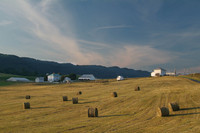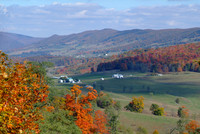By Ruth A. Hill
Inside the 1700s Irish farm forge at Frontier Culture Museum, sweat poured from the brow of the blacksmith. In between his strikes to craft a garden hoe from red-hot iron, he answered our questions about life in the wilderness around him.
"We interpret for 21st Century visitors what life was like for people who came to this frontier from Europe and West Africa," the smithy told us as he took another whack. "Many of our young visitors find it hard to comprehend life without computers, so we get some pretty interesting questions."
Time travel into the 18th Century was a good beginning for the few days' adventure my friend Jan and I spent in the Virginia Highlands region, starting in the mountain town of Staunton. Located at the southern end of the Shenandoah Valley, the sparsely populated region is one of the commonwealth's sweetest spots for scenery, outdoor fun, American heritage and unexpected cultural experiences.
We found a lot more than the heritage museum to like in Staunton, a small town jewel that also offers its visitors an outsized performing arts and culture scene. Centerpiece is the Blackfriars Playhouse, the world's only authentic replica of Shakespeare's early 17th-century indoor stage. It's home to the American Shakespeare Center company, whose robust Elizabethan-style performance of "Anthony and Cleopatra" left us wanting more of the bard's genius.
The Blackfriars sits in the historic downtown district amid handsomely preserved Victorian facades with houses, shops and restaurants such as Emilio's Italian, where we lunched on the house's memorable squash ravioli.
From Staunton, Route 250's winding way carried us across several mountains and into Monterey, Highland County's town center. With one stoplight, a handful of storefronts and the vintage Highland Inn, it hasn't changed much since Harvey Firestone and Henry Ford stopped by during a camping trip more than a century ago.
Inside Highs Restaurant we enjoyed comfort food and conversation with some locals.
"How has Highland with all its beauty remained so sparsely populated?" I asked.
"Many people come every March during our Maple Festival," a woman named Pearl said. "Some of them return quite often, and they may think about staying, but unless they farm there's really not much in the way of work and people have to rely on their own resources to live here," she said. Pearl has always been in Highland, she said. Her German and Scottish ancestors settled near Monterey seven generations ago because it looked like their European homelands. She's never thought about leaving.
Roger told us he and his wife moved to the area a couple of decades ago because they fell in love with an old Blue Grass Valley farmhouse. They raise sheep, and Bernice operates a craft shop in the springhouse behind their home where friends display textile works for sale.
"Highland is a special place," Roger said, "and my wife and I hope to never leave it." He said the county has the highest average elevation and the smallest number of people of any jurisdiction east of the Mississippi — about six people per square mile against a national average of about 70. "In the last census, they counted only about 2,000 people on the county's 3,000 acres," he added, "so we're outnumbered by sheep and cattle, and most folks seem to like it that way."
We followed our lunchtime advice to ride west a bit more on Route 250. Dividing Waters Farm came into our view at the intersection of Route 640. We stopped, left our car and contemplated a stunning scene in Blue Grass Valley. At the center of lush, green terrain rising to nearly 4,000 feet was a cluster of whitewashed buildings — a manor house with wraparound porch, country store and barn buildings. The farm takes its name from the location. Headwaters for both the James and Potomac rivers are on the property. We learned the 800-acre farm is up for sale for the first time in seven generations, and we contemplated changes that might be ahead for that Highland heritage we felt should be somehow preserved.
Much of Highland's terrain reminded us of New England — without the birches but with sugar maple trees that make the region the farthest southern location for maple syrup production celebrated each March at the Maple Festival. We acquired the local product at McDowell's Sugar Tree Country Store next to a museum about Stonewall Jackson's local Civil War battle.
By following Route 220 south about 40 miles into Bath County we arrived at the 2,300-acre spread that is the Omni Homestead Resort in Hot Springs. Guests have been "taking the waters" at various incarnations of the resort since before the American Revolution — 250 years in 2016. With all its family-friendly recreational, dining and sleeping amenities, the Omni Homestead remains the highlands region's centerpiece for lodging, dining and business meetings. After cocktails in the Great Hall's lobby bar, we looked around some of the resort's public spaces, including the Spa Garden network of natural hot springs and pools.
Our Bath lodging choice was smaller and more personal at King's Victorian Inn, also in Hot Springs. Innkeepers Liz and Richard King welcomed us into their beautifully restored and decorated 1899 Victorian interior like long-lost family. Spacious suites decorated in a contemporary style are the inn's hallmark. Liz's indulgent breakfasts encouraged us to enjoy some slow mornings as we gleaned advice on local touring.
Like Highland, Bath's mountain beauty makes it a destination for lovers of both nature and outdoor recreation.
"Depending on the season, we get a lot of hunters and fishermen," Liz said, "along with bikers and hikers. In recent years, a number of galleries and gift boutiques have been added in both Hot Springs and Warm Springs. Really, we have something for everyone."
Bath's "everyone" includes music-lovers who patronize the Garth Newel Music Center. The center's location on a historic country estate location offers not only classic to jazz programming but also casual pre-performance dinners of cuisine prepared by a resident chef. Our night of a beef tenderloin dinner and piano quartet performance concluded with a "dark skies" finale by nature. Above the hills the constellations sparkled totally unfettered by city lights.
WHEN YOU GO
For general information on travel in Virginia's Western Highlands, visit www.visitvamountains.com
Specific destination information is here:
Highland County: www.highlandcounty.org
Bath County: www.discoverbath.com
Staunton: www.visitstaunton.com



Ruth A. Hill is a freelance writer. To read features by other Creators Syndicate writers and cartoonists, visit the Creators Syndicate website at www.creators.com.






View Comments